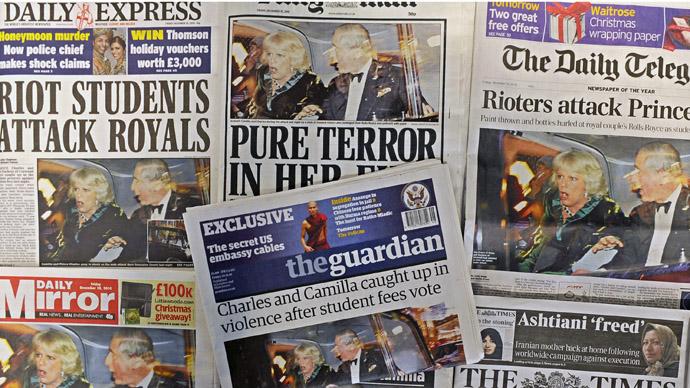'Press bosses want profit, trust in British media to keep falling'

More than 70 percent of adult Britons do not trust journalists’ reports, according to a recent poll. Investigative journalist Tony Gosling blames the lack of trust in “superrich” media bosses who put turnover before reliability.
The IPSOS MORI poll published February 16, involved 1,018 adults aged 18+ across Great Britain. The survey found only 21 percent of Britons said they trusted journalists and seven more percent of respondents said they were unsure. However, 69 percent of people said that they trust news presenters.
To clarify these results RT talked to investigative journalist Tony Gosling, who says that in modern Britain truthful reporting can come with negative consequences.
RT:Only 21 per cent of people in the IPSOS/MORI poll trust journalists to tell the truth in Britain. How do you feel about that, as a journalist?
Tony Gosling: Well, it’s not the fault of journalists because the people who control the media are not the journalists themselves. Journalists are hired and fired by the managers and by editors of newspapers – the senior staff.
RT:So it’s the bosses’ faults?
TG: It is, actually. It’s the owners as well. One of the byproducts of the financial crisis is that it’s been very handy for some because it’s become much easier to hire and fire journalists so what’s happening is that media is concentrating into fewer and fewer hands and these owners are basically using their outlets to pedal their own political line. This is the case right across the Western world now, and that of course plays into the hands of the rich. The super-rich. The millionaires. The people who can afford to buy these newspapers.
For example, they don’t make a profit, many papers now. The Independent, which is actually one of the exceptions – quite a good paper here in Britain – was bought for a pound. And I would suggest that the “i,” which the Independent produces, is a very, very good paper.
The trouble is that that is not the only outlet. The general trend is the other way, towards the managers and editors. The ownership, Rupert Murdoch and people like this - the Barclay twins who own the telegraph empire, are pushing their own line and hiring and firing journalists very easily.
And it’s very difficult to tell the truth. The idea being that if you’re a journalist like me, you know, don’t rock the boat – you might end up on the DOLE (Department of Labor and Employment).
RT:People feel their media is too-frequently lying to them. Is that really fair, though? Or is it overblown?
TG: I think it’s overblown to say they’re lying, it’s just that we’re not told the entire truth.
For example in Denmark about ten years ago, one of the news presenters was actually sacked for saying at the end of the news, “That is what we decided to tell you tonight,” as a bit of a joke. But there is a lot that isn’t being said in our media.
The BBC is losing its credibility slowly since the 1990s because of the way it’s been being managed – not by fault of the journalists. For example at the moment, we’ve got the chairman of the BBC – Chris Patton. He’s a former senior conservative cabinet minister. He’s coming from a very specific point of view. I don’t really think you should have people of that political persuasion or any ex-senior politicians running the BBC.
And the result has been things like the Savile scandal has come out but no one has actually been sacked for that…the staff has been moved around instead. This is the trouble. It’s like shifting the deck chairs of the Titanic at the senior management level. There needs to be some new blood, younger blood, in some of these senior management jobs.
And what often happens is that if someone isn’t very good on air as a journalist, and they’re not actually managing to do the job they get promoted into the senior management positions. So what we need to do is get rid of some of this high tier management and let the journalists just get on and do their jobs.
The statements, views and opinions expressed in this column are solely those of the author and do not necessarily represent those of RT.











